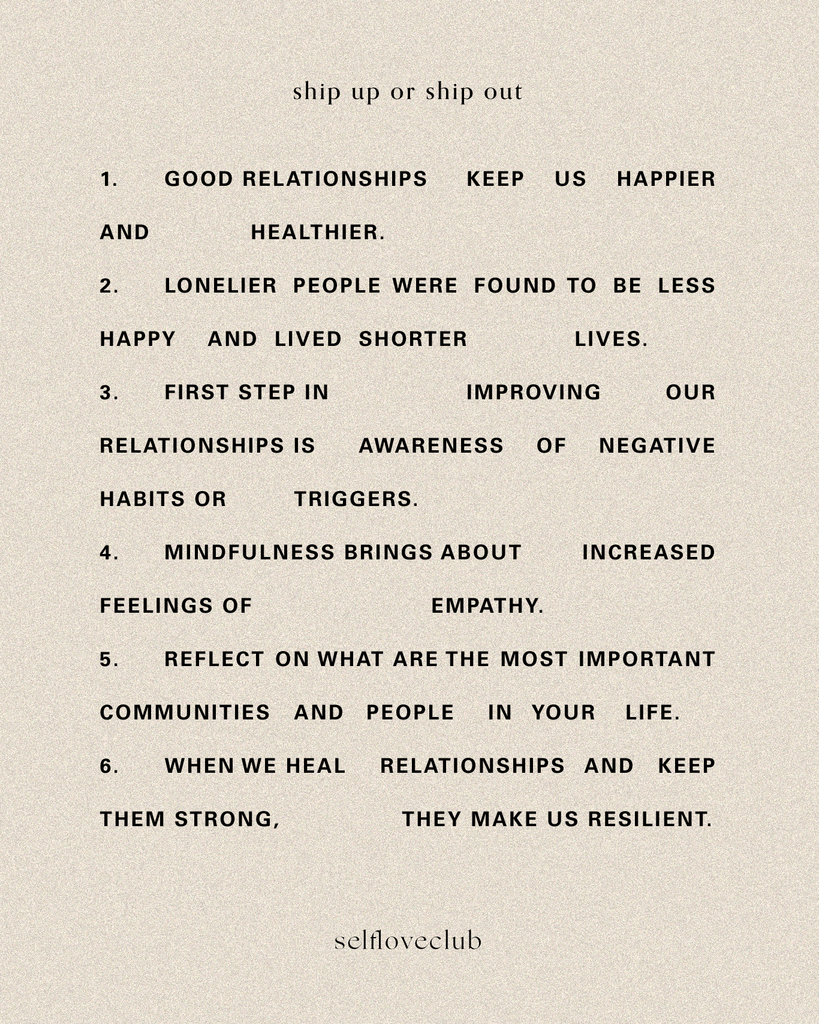Week 2: Ship up or Ship out
If you’re anything like me, you’ve come through the past two years thinking, “people, who needs them! I’m cool sitting alone on my couch forever with my one person and my dog.” But then catch me in a cheerful conversation with a friend or neighbour and I walk away feeling amazingly fulfilled. People... turns out we need them?

Researchers at Harvard are conducting one of the longest studies on adult development ever undertaken. The incredible 75-year study seeks to investigate what keeps people happy and healthy over the course of their lifetime. The lives of 724 men were tracked from the time they were teenagers through old age. They were asked questions about health, work and personal life to gain insight into factors that support wellbeing and protect against pain and disability in later life.
The data resulted in many interesting insights, but the clearest message from the 75-year study was that good relationships keep us happier and healthier. They found that people who are more socially connected to family, friends and community were happier, healthier, and lived longer lives than those who were less well connected.
People reporting feelings of loneliness were found to be less happy, their health and cognitive functioning declined more quickly in old age, and they lived shorter lives.
While some of that might seem obvious, the researchers also discovered that relationship quality matters. They found an association between high conflict marriages and poor health outcomes; people who were most satisfied in their relationships at age 50 were the healthiest at age 80.
Excellent, I’m on board. So how do we improve these relationships? For starters: awareness. Recognizing our habits and triggers in ourselves is harder than you think.
This could be the tendency to snap at someone when you feel threatened or insecure (— guilty). Or perhaps the habit of reaching for a cigarette when you feel stressed or uptight. The important thing is that as soon as we become aware of that habit or tendency, it begins to change in nature.
Mindfulness and awareness has been shown to bring about increased feelings of empathy. Perhaps most powerfully, it’s been shown to increase levels of acceptance. And what relationship couldn’t benefit from more of those things?
Understanding ourselves better brings about a sense of confidence and contentment. This inevitably has an effect on those around us. Not only do we tend to be less reactive, but we also give people the space and understanding to let them be who they truly are. It can be very easy to carry around past hopes or disappointments with us from previous relationships, projecting those onto the present moment. Often what we end up experiencing with a person is actually more a reflection of the past than the present. When we become more aware of our own insecurities we can allow our external relationships to thrive.
It’s not just our romantic relationships that benefit us, either. Connecting with your children, friends, other family members, coworkers and even strangers can all invoke these feel-good chemical reactions in the body.
Take a moment to reflect on what are the most important communities and groups you belong to in your life at the moment (or ones you would like to belong to). Think how you can get involved, become more engaged, and nurture those relationships. It’s hard feeling like you’re the one always reaching out — but you’d be surprised how many people are dealing with their own insecurities or feeling the exact same way.
When we know how to heal relationships and keep them strong, they make us resilient. All these clichés about how love makes us stronger aren’t just clichés; it’s science!





Leave a comment
This site is protected by hCaptcha and the hCaptcha Privacy Policy and Terms of Service apply.